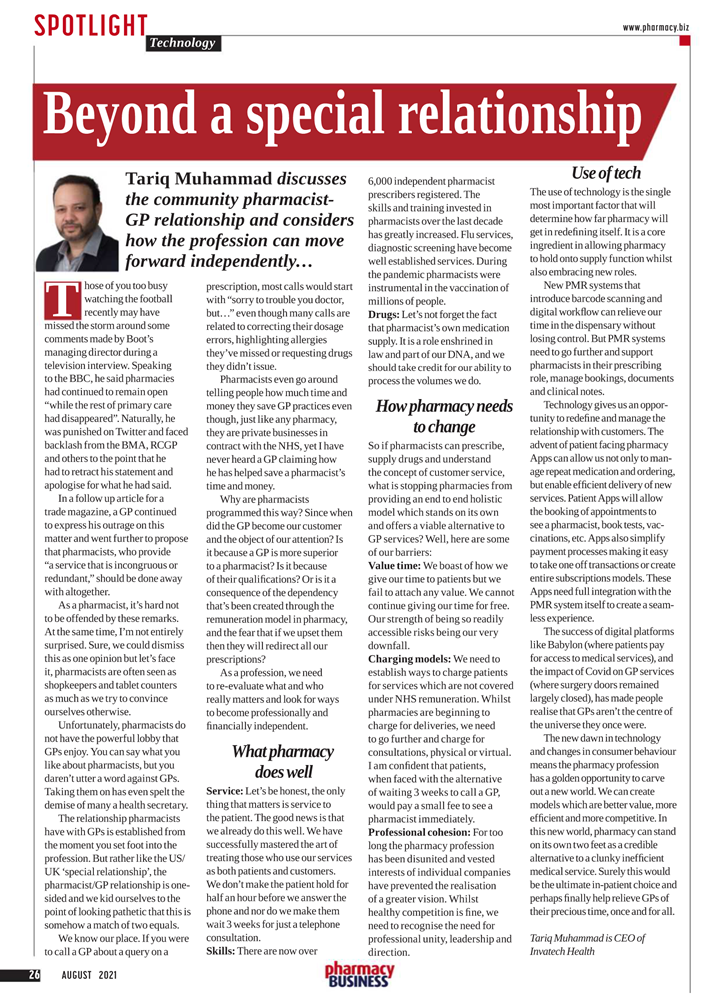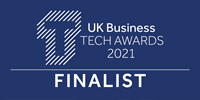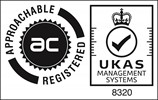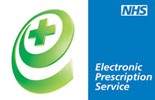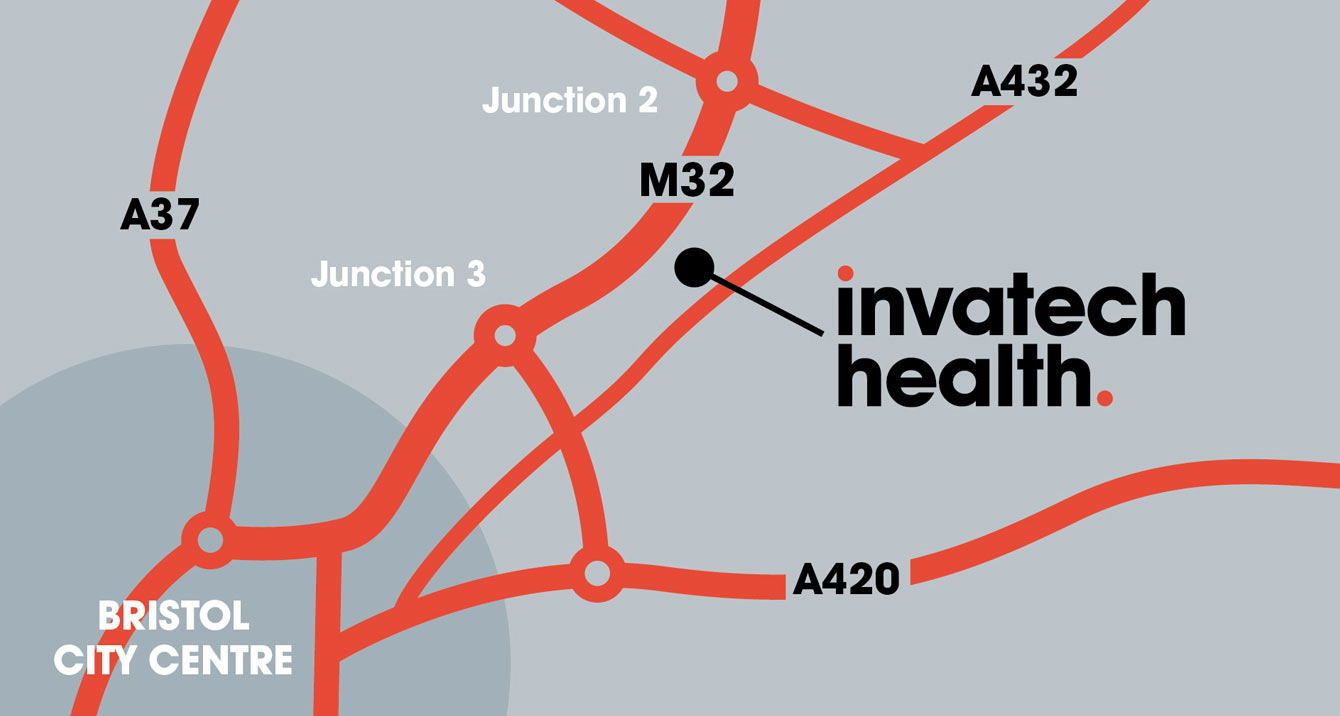The Special Relationship between Pharmacists and GPs
Those of you too busy watching the football recently may have missed the storm around some comments made by Boot’s MD during a BBC Breakfast interview. During his interview he said that pharmacies had continued to remain open “while the rest of primary care had disappeared”. Naturally he was punished on Twitter and faced backlash from the BMA, RCGP and others to the point that he had to retract his statement and apologise for what he had said.
In a follow up article in Pulse magazine, a GP continued to express his outrage on this matter but went further to propose that we should do away with pharmacists altogether stating they are an anomaly, “providing a service that is incongruous or redundant”.
As a pharmacist, it’s hard not to be offended by these remarks. At the same time I’m not entirely surprised. Sure, we could dismiss this as one opinion but let’s face it, pharmacists are often seen as shopkeepers and tablet counters as much as we try to convince ourselves otherwise.
Unfortunately, pharmacists do not have the powerful lobby that GPs enjoy. You can say what you like about pharmacists, but you daren’t utter a word against GPs. Taking them on has even spelt the demise of many a Health Secretary.
The relationship pharmacists have with GPs is established from the moment you set foot into the profession. But rather like the US/UK ‘special relationship’, the pharmacist/ GP relationship is one sided and we kid ourselves to the point of looking pathetic that this is somehow a match of two equals.
We know our place. If you were to call a GP about a query on a prescription, most calls would start with “sorry to trouble you doctor, but…” even though many calls are related to correcting their dosage errors, highlighting allergies they’ve missed or requesting drugs they didn’t issue.
Pharmacists even go around telling people how much time and money they save GP practices even though, just like any pharmacy, they are private businesses in contract with the NHS, yet I have never heard a GP claiming how he has helped save pharmacist’s time and money.
Why are pharmacists programmed this way? Since when did the GP become our customer and the object of our attention? Is it because a GP is more superior to a pharmacist? Is it because of their qualifications? Or is it a consequence of the dependency that’s been created through the remuneration model in pharmacy, and the fear that if we upset them they will redirect all our prescriptions?
As a profession, we need to re-evaluate what and who really matters and look for ways to become professionally and financially independent.
What Pharmacy Does Well
Service - Let’s be honest, the only thing that matters is service to the patient. The good news is that we already do this well. We have successfully mastered the art of treating those who use our services as both patients and customers. We don’t make the patient hold for half an hour before we answer the phone and nor do we make them wait 3 weeks for just a telephone consultation.
Skills - There are now over 6,000 independent pharmacist prescribers registered. The skills and training invested in pharmacists over the last decade has greatly increased. Flu services, diagnostic screening have become well established services. During the pandemic pharmacists were instrumental in the vaccination of millions of people.
Drugs - Let’s not forget the fact that pharmacist’s own medication supply. It is a role enshrined in law and part of our DNA, and we should take credit for our ability to process the volumes we do.
How Pharmacy Needs to Change
So if pharmacists can prescribe, supply drugs and understand the concept of customer service, what is stopping pharmacies from providing an end to end holistic model which stands on its own and offers a viable alternative to GP services? Well, here are some of our barriers;
Value time - We boast of how we give our time to patients but we fail to attach any value. We cannot continue giving our time for free. Our strength of being so readily accessible risks being our very downfall.
Charging Models - We need to establish ways to charge patients for services which are not covered under NHS remuneration. Whilst pharmacies are beginning to charge for deliveries, we need to go further and charge for consultations, physical or virtual. I am confident that patients, when faced with the alternative of waiting 3 weeks to call a GP, would pay a small fee to see a pharmacist immediately.
Professional Cohesion - For too long the pharmacy profession has been disunited and vested interests of individual companies have prevented the realisation of a greater vision. Whilst healthy competition is fine, we need to recognise the need for professional unity, leadership and direction.
The Use of Technology
The use of technology is the single most important factor that will determine how far pharmacy will get in redefining itself. It is a core ingredient in allowing pharmacy to hold onto supply function whilst also embracing new roles.
New PMR systems that introduce barcode scanning and digital workflow can relieve our time in the dispensary without losing control. But PMR systems need to go further and support pharmacists in their prescribing role, manage bookings, documents and clinical notes.
Technology gives us an opportunity to redefine and manage the relationship with customers. The advent of patient facing pharmacy Apps can allow us not only to manage repeat medication and ordering, but enable efficient delivery of new services. Patient Apps will allow the booking of appointments to see a pharmacist, book tests, vaccinations, etc. Apps also simplify payment processes making it easy to take one off transactions or create entire subscriptions models. These Apps need full integration with the PMR system itself to create a seamless experience.
The success of digital platforms like Babylon (where patients pay for access to medical services), and the impact of Covid on GP services (where surgery doors remained largely closed), has made people realise that GPs aren’t the centre of the universe they once were.
The new dawn in technology and changes in consumer behaviour means the pharmacy profession has a golden opportunity to carve out a new world. We can create models which are better value, more efficient and more competitive. In this new world, pharmacy can stand on its own two feet as a credible alternative to a clunky inefficient medical service. Surely this would be the ultimate in patient choice and perhaps finally help relieve GPs of their precious time, once and for all.

